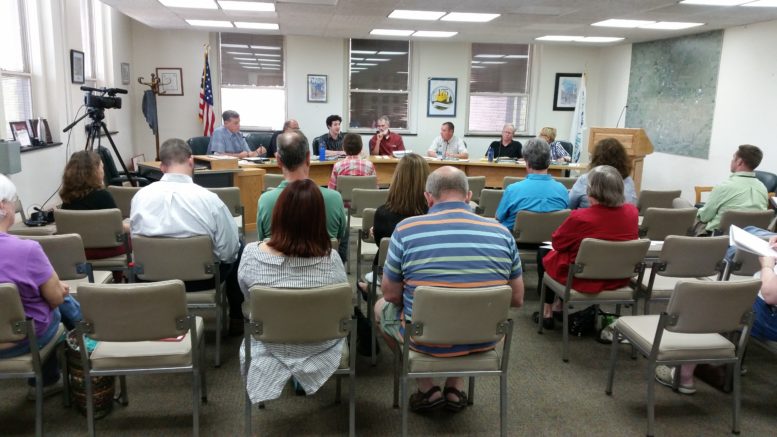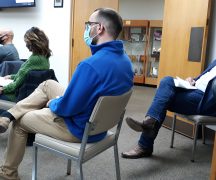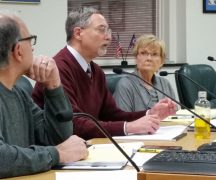By JAN LARSON McLAUGHLIN
BG Independent News
Absence makes the heart grow fonder – even if it’s just the possibility of losing city trash pickup.
Bowling Green City Council members held a meeting prior to their regular meeting Monday evening to debate how to keep afloat the city’s sinking general fund revenue. Prior to the meeting, the options had been narrowed down to three basic ideas:
- Redistribute income tax revenue, which would require a vote by city residents. This option would take money – $500,000 to $1 million – from city utilities and put it in the general fund.
- Charge a tree trimming assessment on property taxes, which would not require a citizen vote. An owner of a $150,000 home would pay $80 to $100 a year, which would generate about $300,000.
- Change city trash pickup, either by privatizing collection or maintaining city collection but start charging residents for the service. Privatizing would save the city $800,000 annually. Continuing the city service would cost the average homeowner $12 or $13 a month. This would not require a vote by citizens.
Of those options, the one creating most citizen uproar is the privatization of garbage collections. That response came as a surprise to Bob McOmber, who has served on council for 12 years. During that period, trash pickup has been the source of many complaints.
“They tell us how lousy our trash collection is,” McOmber said. But now that the service may go to a private company, the feelings have changed. “We love our trash collection,” he said. And many citizens have even expressed a willingness to pay the city a fee for the service.
Most communities in the region either charge for trash collection or have privatized their operations. A disadvantage of the trash options is that homeowners will bear the brunt, since apartments and businesses already use private trash haulers.
However, some felt the trash fee was “the most fair option,” since it entails a fee for a service. “It’s pretty clear cut,” Council President Mike Aspacher said.
The redistribution of the city’s 2 percent income tax would be the least noticed by city residents, but would be the worst of the options for economic development, McOmber said.
The city would likely have to raise water and sewer rates to make up the loss of money shifted from the utilities budget into the general fund. However, the average resident’s water and sewer bill is $20 now, and the projected 7 percent increase would be negligible.
“The average customer wouldn’t know it if we didn’t tell them about it,” McOmber said, noting that Bowling Green has some of the lowest rates in the region.
Sandy Rowland agreed that even with the increase, the city’s rates would be lower than most communities in the region.
However, the impact on businesses would be much greater.
McOmber pointed out that utilities officials with the city worry that the utilities budget will continue to be picked at. “They are fearful this is the beginning of a slippery slope,” he said. “If I were in their shoes, I’d have that concern, too.”
Bruce Jeffers noted that the low utility rates help Bowling Green compete with other entities for business.
Scott Seeliger expressed concerns about changing a formula that has served the city so well. “I’m uneasy with it,” he said.
And Aspacher said there may be “unintended consequences” of the income tax redistribution.
The option of a tree trimming assessment was shot down by Aspacher, who said it would conflict with the school levy on the fall ballot. “This would prove to be an additional burden on people’s property taxes.”
Though council is still debating its options, members agreed that Bowling Green City School District efforts to pass a levy for new buildings must be a major consideration. Council members neither want to jeopardize the chances of the school levy in November or add unmanageable burdens to taxpayers.
Bowling Green Superintendent Francis Scruci said after the meeting that he appreciated those concerns.
“I think that speaks to Bowling Green as a whole. This is a community that understands community,” Scruci said.
City Council realized last year that efforts had to be made to replenish the city’s general fund revenue. The fund has lost $1.3 million annually in state cuts, starting July 1 it will lose a cable franchise fee of $300,000 a year, and is bringing in $500,000 less annually in interest income. That all adds up to a $2.1 million shortfall in the city’s $15 million general fund.
Instead of getting better, McOmber reported that income tax revenue is 3 to 4 percent behind expectations this year.
“That’s pretty unusual,” he said.
City Council members rejected the option of increasing the city income tax, with Seeliger and Rowland noting the need to be sensitive to the school’s fall levy.
Those concerns also led most of the council members to aim low – suggesting that the city shoot for replenishing $800,000 to the general fund annually, rather than $1.3 million.
“I’ve been tossing this over in my mind for weeks now,” McOmber said.
Aiming low means the city may need to go back to the drawing board soon to replenish more funds. Daniel Gordon was the one council member who felt council should go for the $1.3 million.
John Zanfardino and Bruce Jeffers struggled with the fact that the city’s Community Action Plan is going to be costly to implement.
“If we want our city to grow and become better, we have to spend money to do that,” Jeffers said, smiling as he added that he has always thought of himself as a “liberal big spender.”
But the needs of the school district have to be considered. “We’re one community, though we’re two governing bodies,” Jeffers said.
Aspacher cautioned that council can always find good uses for money – especially with the new Community Action Plan. “There are going to be opportunities for us to reinvest this additional revenue,” he said.
Seeliger agreed. “We would find very solid ways to spend that.”
Zanfardino said the city general fund could recover a bit later this year if expenses come in lower than expected.
But Gordon warned, “We could face further cuts from the state.”
Aspacher said the general fund meetings have been beneficial for council as members work to be responsible with taxpayer dollars. “I think this has been a very healthy discussion for us,” he said.
Council will meet again to make a decision on how to add to the deflated general fund, on June 19 at 6 p.m. McOmber said he would like the first half hour to be set aside for public comment.
Rowland suggested that in order to make best use of the time, citizens contact their council members prior to the meeting to express their feelings about the general fund revenue options.





